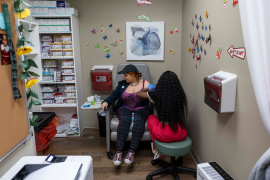New York City, August 31, 2005—Sickness and health problems among working-age Americans and their families carry an estimated price tag of $260 billion in lost productivity each year. This reflects economic losses from adults with chronic disease, disability, or other health problems who are not working; workers who take sick days to care for themselves or sick family members; and workers who show up for work sick or worried about sick relatives, according to a study released today by The Commonwealth Fund.
Approximately 18 million adults, 12 percent of all U.S. adults ages 19 to 64, have a disability, handicap, chronic disease, or other health problem, and are not employed as a result. This lack of labor force participation takes a toll both on families and the overall economy in terms of lost income. Valued at the minimum wage, the loss amounts to $185 billion annually.
In addition, an estimated 69 million workers reported missing days of work due to illness in the past year, for a total of 407 million lost work days in 2003, and $48 billion in lost economic output.

"The health status of workers has significant implications for the economy," said Karen Davis, president of The Commonwealth Fund and lead author of this study. "The main focus of policymakers has been on the cost of providing health insurance to all Americans, but we have neglected to consider the costs sustained by those who are too sick to work or function effectively."
When workers show up for work even though they are not feeling well or are distracted with thoughts of a sick family member or their own health, their reduced productivity can exact a cost in the workplace. Approximately 55 million workers reported a time when they were unable to concentrate at work because of illness or a family member's illness. This amounted to 478 million days per year of reduced productivity, at an estimated cost of $27 billion. There is also increased risk of injury and spreading contagious diseases to co-workers.
"Providing workers with the means to maintain their health—through affordable and comprehensive health insurance coverage, sick leave, and disease management programs—has the potential to enhance the health and productivity of our workforce," said Sara R. Collins, senior program officer at The Commonwealth Fund and a co-author of this report. "Investments in worker health could yield economic payoffs for working families, employers and the economy as a whole."
Adults with children, either single or married, were more likely to report taking any sick days than single or married adults without children. They were also more likely to report inability to fully concentrate at work, according to the report, Health and Productivity Among U.S. Workers, by Fund staff Karen Davis, Sara R. Collins, Michelle M. Doty, Alice Ho, and Alyssa L. Holmgren.
Employer benefits such as paid sick leave or paid time off to see a physician or dentist can make a difference in worker productivity. Workers who are unable to take paid time off to see a doctor during work hours were more likely to miss work or experience one or more days at work in which they were unable to concentrate because of their own illness or that of a family member.
The authors note several strategies that policymakers and business leaders could adopt to help stem economic losses due to illness:
- Research has shown that well-run corporate disease management and health promotion programs can improve workers' health and productivity.
- Providing health insurance coverage for all workers would increase the use of preventive care and help ensure early treatment of acute illnesses and ongoing management of chronic conditions.
- Sick leave and paid time off to see a physician are important benefits to ensure that workers have time to get needed care, recover, or tend to sick family members.
Data come from The Commonwealth Fund Biennial Health Insurance Survey (2003), a national telephone survey conducted September 3, 2003 through January 4, 2004 among a random, nationally representative sample of 4,052 adults (defined as individuals age 19 and older) living in the continental United States, weighted by age, sex, race/ethnicity, education, household size, and geographic region. The analytic sample consists of 1,808 part-time and full-time workers. The survey has an overall margin of sampling error of +/– 2 percentage points at the 95 percent confidence level. The 50 percent survey response rate was calculated consistent with standards of the American Association for Public Opinion Research.


